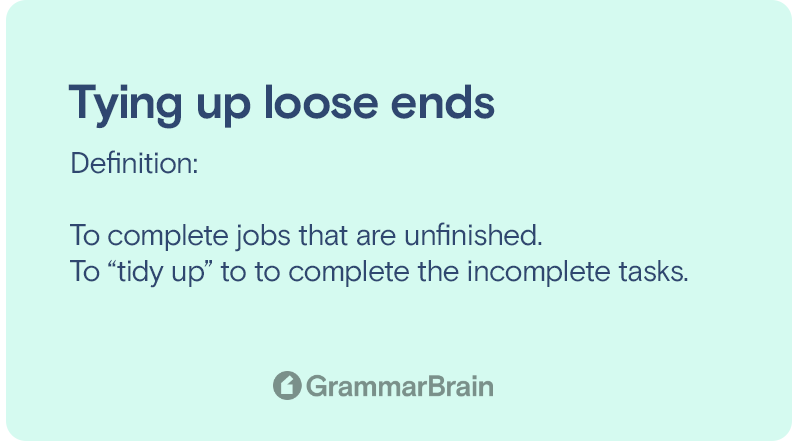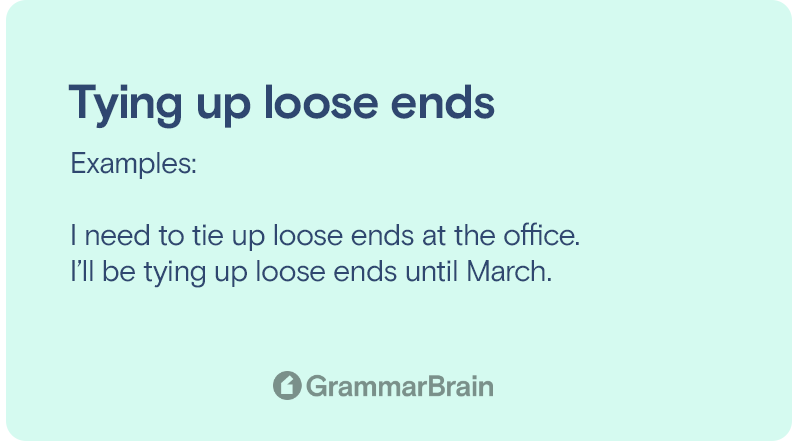Tying up loose ends is an idiom we use to describe a situation. The meaning of the idiom is to complete or finish some work. In our daily life, we often use this phrase. It’s referred to when there are jobs that are left unfinished and need to get completed in order to consider the situation or job fully resolved.
The Idiom “Tying Up Loose Ends”
In our daily life, we often use or hear the phrase “tying up loose ends.” An idiom is a sentence or a group of words that is used to describe a situation that doesn’t exactly align with the original meaning. For example, “tying up loose ends” is not related to the actual act of tying.
Tying up loose ends derives from finishing work. To tell someone to finish or complete some unfinished business, we use the phrase tie up loose ends in an idiomatic way.

Meaning of “Tying Up Loose Ends”
The ends of a rope, string, or cable that need to be fastened are called “loose ends.” Most sources assume that both the phrase “loose ends” and the broader expression “tying up loose ends” have nautical roots and origins.
“Tie up loose ends” is an idiom we commonly use to tell someone to finish work. “Tie-up loose ends” refer to addressing the minor repercussions of a prior action; to finish, complete, or tidy up.
This expression is frequently used in formal, conversational English and corporate environments. Tie up some loose ends of a work project is something that employees at a corporation might discuss.
In this case, they are referring to the fact that a project still needs a few finishing touches before it is considered complete.
Since the 1800s, the idiom “tie up loose ends” has been used to refer to unfinished jobs.

Example of Using Tying Up Loose Ends In a Sentence
For describing many situations related to closing or finishing work, we use the idiom “tie up loose ends.” Some of them can be to order or ask to finish unfinished business, and some can be used to clean up messes or clear up clerical tasks.
See the examples below for how we can use the idiom in a sentence:
- Cole probably killed him to tie up any loose ends.
- They said they just wanted to tie up loose ends.
- I know you’re trying to tie up loose ends to go home early.
- I have to tie up loose ends of this project by 8:00 pm.
- If you want to work with us, we got to tie up loose ends.
- I need to tie up a few loose ends before I leave the office.
- Its only 10 days left to the final test. I need to tie up loose ends.
- Briana claims that she is unable to tie up loose ends.
- Please assist me in tying up this project’s loose ends so that I can submit it by 8 pm.
FAQs
What’s another phrase for tying up loose ends?
There are synonyms for tying up loose ends. They are:
- Completing
- Finishing Up
- Settling down
- Finalize
- Bring to close
- Close down etc.
What does it mean when someone says to tie up loose ends?
Where does the phrase tie up loose ends come from?
The majority of sources assume that both the phrase “loose ends” and the broader expression “tying up loose ends” have nautical roots and origins.
Inside this article
Fact checked:
Content is rigorously reviewed by a team of qualified and experienced fact checkers. Fact checkers review articles for factual accuracy, relevance, and timeliness. Learn more.
Core lessons
Glossary
- Abstract Noun
- Accusative Case
- Anecdote
- Antonym
- Active Sentence
- Adverb
- Adjective
- Allegory
- Alliteration
- Adjective Clause
- Adjective Phrase
- Ampersand
- Anastrophe
- Adverbial Clause
- Appositive Phrase
- Clause
- Compound Adjective
- Complex Sentence
- Compound Words
- Compound Predicate
- Common Noun
- Comparative Adjective
- Comparative and Superlative
- Compound Noun
- Compound Subject
- Compound Sentence
- Copular Verb
- Collective Noun
- Colloquialism
- Conciseness
- Consonance
- Conditional
- Concrete Noun
- Conjunction
- Conjugation
- Conditional Sentence
- Comma Splice
- Correlative Conjunction
- Coordinating Conjunction
- Coordinate Adjective
- Cumulative Adjective
- Dative Case
- Determiner
- Declarative Sentence
- Declarative Statement
- Direct Object Pronoun
- Direct Object
- Diction
- Diphthong
- Dangling Modifier
- Demonstrative Pronoun
- Demonstrative Adjective
- Direct Characterization
- Definite Article
- Doublespeak
- False Dilemma Fallacy
- Future Perfect Progressive
- Future Simple
- Future Perfect Continuous
- Future Perfect
- First Conditional
- Irregular Adjective
- Irregular Verb
- Imperative Sentence
- Indefinite Article
- Intransitive Verb
- Introductory Phrase
- Indefinite Pronoun
- Indirect Characterization
- Interrogative Sentence
- Intensive Pronoun
- Inanimate Object
- Indefinite Tense
- Infinitive Phrase
- Interjection
- Intensifier
- Infinitive
- Indicative Mood
- Participle
- Parallelism
- Prepositional Phrase
- Past Simple Tense
- Past Continuous Tense
- Past Perfect Tense
- Past Progressive Tense
- Present Simple Tense
- Present Perfect Tense
- Personal Pronoun
- Personification
- Persuasive Writing
- Parallel Structure
- Phrasal Verb
- Predicate Adjective
- Predicate Nominative
- Phonetic Language
- Plural Noun
- Punctuation
- Punctuation Marks
- Preposition
- Preposition of Place
- Parts of Speech
- Possessive Adjective
- Possessive Determiner
- Possessive Case
- Possessive Noun
- Proper Adjective
- Proper Noun
- Present Participle
- Prefix
- Predicate



